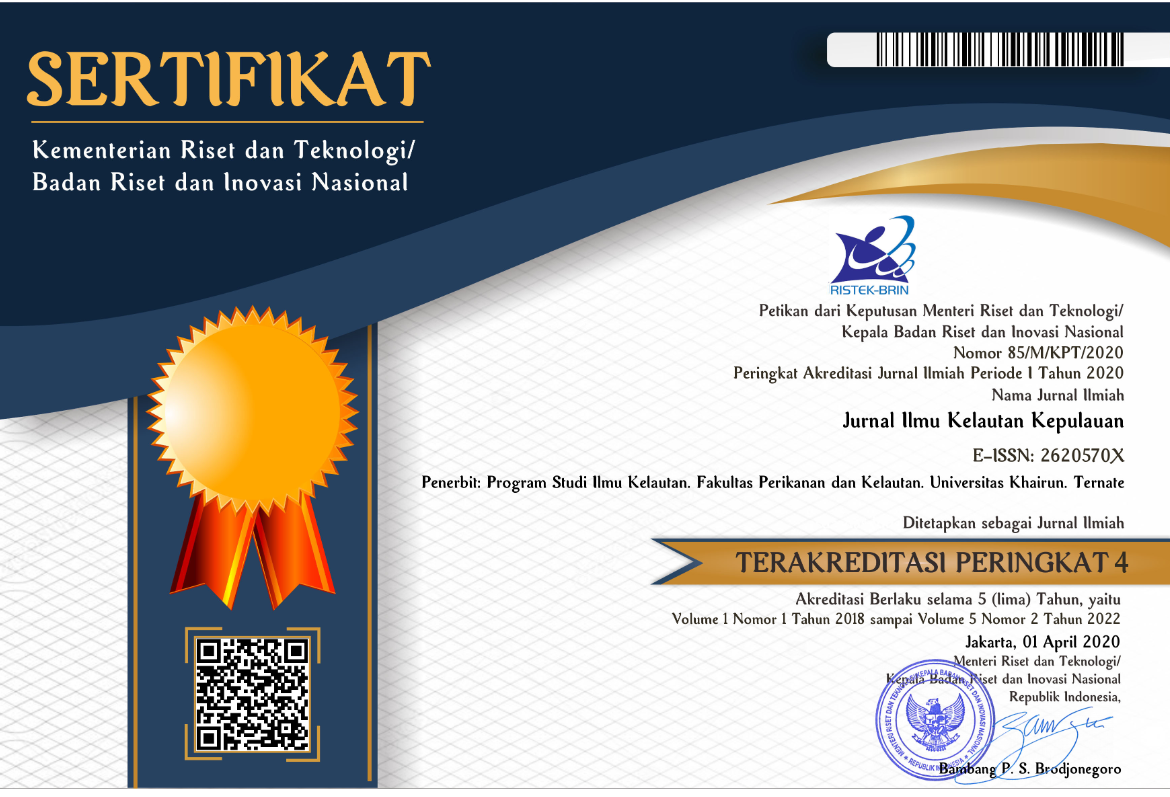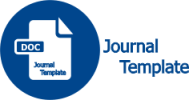Focus and Scope
Jurnal Ilmu Kelautan Kepulauan is a peer-reviewed and open access biannually (June and December) that published by Marine Science Study Program, Faculty of Fisheries and Marine, Khairun University. Jurnal Ilmu Kelautan Kepulauan accepts manuscripts written in Indonesia and English related of scope to marine sciences and fisheries. Jurnal Ilmu Kelautan Kepulauan publish in two categories of papers; 1). Original research papers, and 2). Critical review articles. The scope of this journal includes, but is not limited to the research results of:
- Marine science and Technology
- Oceanography
- Aquatic resources management
- Aquaculture
- Fish capture technology
- Fisheries product technology
- Marine and fisheries biotechnology
- Marine geographic information system
- Marine pollution and bioremediation
Section Policies
Artikel
Peer Review Process
All manuscripts received by Jurnal Ilmu Kelautan Kepulauan will be peer-reviewed by at least two reviewers via Open Journal System (OJS) based on the originality, contribution to the field of the scientific area, coherence of the analysis, grammar, and style. This journal uses the framework of Double-Blind Peer Preview Process policy, which means that both the reviewer and author identities are concealed from the reviewers, and vice versa, throughout the review process. The final decision on the acceptability, or otherwise of manuscripts will be taken by the editor-in-chief based on reviewers' comments presented during an editorial board meeting. Scanning for instances of plagiarism present in manuscripts will be conducted by means of Turnitin software. Peer reviewers that collaboration with Jurnal Ilmu Kelautan Kepulauan are the experts in field of marine sciences and fisheries. They were experienced in the prestigious journal management and publication that were spread around the national and International.
The editorial board considers the feedback provided by the peer reviewers and arrives at a decision. The following are the most common decisions:
- accept without any changes (acceptance): the journal will publish the paper in its original form
- accept with minor revisions (acceptance): the journal will publish the paper and asks the author to make small corrections
- accept after major revisions (conditional acceptance ): the journal will publish the paper provided the authors make the changes suggested by the reviewers and/or editors
- revise and resubmit (conditional rejection): the journal is willing to reconsider the paper in another round of decision making after the authors make major changes
- reject the paper (outright rejection): the journal will not publish the paper or reconsider it even if the authors make major revisions
The reviewer’s decision will be considered by the Editorial Boards to determine the ensuing process of the manuscript.
- Revision Stage. Once the manuscript has been received with notations of minor or major revisions, it will be returned to the author with a review summary form. For manuscripts accepted with major revisions, authors are allotted 4-6 weeks to revise. Whereas for manuscripts accepted with minor revisions, 1 week is allotted for revision. When returning the revised manuscript, the author is required to fill in and attach the cover letter and authors’s declaration. ÂÂ
- Final decision. At this stage, the manuscript will be re-evaluated by the Editorial Boards to ensure that the author has revised in response to the reviewers’ concerns. In this final decision, the manuscript may still be rejected if the author did not seriously conduct the revisions necessary.
- Proofread. Once the manuscript has been deemed acceptable by the Editorial Boards, it will undergo a proofreading process to maintain linguistic quality.
- Publication confirmation. At this stage, the final layout of the manuscript will be resent to the author to ensure that the content is in accordance with the author’s writing. At this stage, the author may revise any typographical error found in the final manuscript. Once confirmation from the author is given, the Editor will process the manuscript for online publication on the website as well as print publication. The author(s) will receive the final version of the manuscript as a PDF file. PROOF of all manuscripts will be provided to the corresponding author. The PROOF should be read carefully, checked against the typed manuscript, and the corrections may be returned within 7 days.ÂÂ
- Rejection confirmation. If manuscript is rejected, the author will be notified by Chief Editor with a statement of reasons for rejection. The author may appeal to Chief Editor if he or she believes an unfair judgment has been made which encloses the author’s reasons. Chief Editor will review and discuss the reasons with Section Editors responsible for the manuscript, and later decide whether to accept or deny the appeal.
- Copyright of manuscripts. Authors submitting manuscripts should understand and agree that copyright of manuscripts of the article shall be assigned/transferred to by Jurnal Ilmu Kelautan Kepulauan. The statement to release the copyright to Jurnal Ilmu Kelautan Kepulauan is stated in author’s declaration Form.
All reviewing process are in double blind peer review and managed by editor in the Open Journal System (OJS).
Publication Frequency
This journal is published twice a year, in June and December.
Open Access Policy
This journal provides immediate open access to its content on the principle that making research freely available to the public supports a greater global exchange of knowledge.







